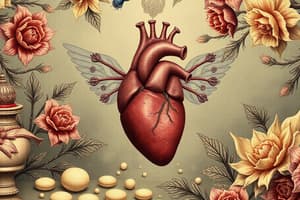Podcast
Questions and Answers
What is the primary action of Amiodarone?
What is the primary action of Amiodarone?
- It is a potassium channel blocker that also affects sodium and calcium channels. (correct)
- It is primarily an anticholinergic agent.
- It enhances platelet aggregation.
- It acts by increasing heart rate.
Which condition is a contraindication for Adenosine?
Which condition is a contraindication for Adenosine?
- Atrial flutter or fibrillation (correct)
- Monomorphic wide complex tachycardia
- Stable SVT
- Symptomatic bradycardia
What is the maximum dosage of Atropine for symptomatic bradycardia?
What is the maximum dosage of Atropine for symptomatic bradycardia?
- 2 mg
- 3 mg (correct)
- 5 mg
- 10 mg
Which of the following is a common side effect of Amiodarone?
Which of the following is a common side effect of Amiodarone?
In what form can Aspirin be administered for acute coronary syndrome?
In what form can Aspirin be administered for acute coronary syndrome?
What is NOT a precaution when using Atropine?
What is NOT a precaution when using Atropine?
What action does Aspirin perform at a cellular level?
What action does Aspirin perform at a cellular level?
What is the initial dosage of Adenosine for stable SVT?
What is the initial dosage of Adenosine for stable SVT?
What is the primary action of Labetalol?
What is the primary action of Labetalol?
Which of the following is a contraindication for the use of Lidocaine?
Which of the following is a contraindication for the use of Lidocaine?
What dosage of Magnesium Sulfate is indicated for Torsades de Point?
What dosage of Magnesium Sulfate is indicated for Torsades de Point?
What is a common possible side effect of Metoprolol?
What is a common possible side effect of Metoprolol?
What class of medication does Fentanyl belong to?
What class of medication does Fentanyl belong to?
Which condition is NOT indicated for Nitroglycerin use?
Which condition is NOT indicated for Nitroglycerin use?
Which of the following is a potential side effect of Ketamine?
Which of the following is a potential side effect of Ketamine?
What is the maximum total dosage for Ketamine when used for pain management?
What is the maximum total dosage for Ketamine when used for pain management?
Which medication is listed as an Ib antiarrhythmic agent?
Which medication is listed as an Ib antiarrhythmic agent?
What class of medication does Nitroglycerin belong to?
What class of medication does Nitroglycerin belong to?
What action does Morphine Sulfate primarily have?
What action does Morphine Sulfate primarily have?
Which medication should be used with caution in patients with hypotension?
Which medication should be used with caution in patients with hypotension?
What is a key action of Magnesium Sulfate in treating arrhythmias?
What is a key action of Magnesium Sulfate in treating arrhythmias?
What is a major concern when administering high doses of Ketamine?
What is a major concern when administering high doses of Ketamine?
Ondansetron primarily acts as which type of medication?
Ondansetron primarily acts as which type of medication?
What is a contraindication for Morphine Sulfate?
What is a contraindication for Morphine Sulfate?
What is a possible side effect of administering calcium chloride rapidly?
What is a possible side effect of administering calcium chloride rapidly?
What is a common contraindication for the use of dopamine?
What is a common contraindication for the use of dopamine?
Which of the following medications stimulates both beta-1 and beta-2 adrenergic receptors?
Which of the following medications stimulates both beta-1 and beta-2 adrenergic receptors?
What adverse effect is specifically associated with the extravasation of dopamine?
What adverse effect is specifically associated with the extravasation of dopamine?
What is NOT a contraindication for ketamine administration?
What is NOT a contraindication for ketamine administration?
Which medication is primarily used for cardiogenic/distributive shock?
Which medication is primarily used for cardiogenic/distributive shock?
Which side effect is NOT associated with epinephrine administration?
Which side effect is NOT associated with epinephrine administration?
What is the action of ketamine during pain management?
What is the action of ketamine during pain management?
Which symptom is most likely to occur as a side effect of digoxin toxicity?
Which symptom is most likely to occur as a side effect of digoxin toxicity?
What is a major contraindication for the administration of Sodium Bicarbonate?
What is a major contraindication for the administration of Sodium Bicarbonate?
In what situation is EKG monitoring especially recommended?
In what situation is EKG monitoring especially recommended?
What is the primary action of promethazine?
What is the primary action of promethazine?
Which of the following side effects is not associated with Furosemide?
Which of the following side effects is not associated with Furosemide?
What is a potential consequence of administering promethazine to a patient on depressants?
What is a potential consequence of administering promethazine to a patient on depressants?
What is the mechanism of action for Sodium Bicarbonate in treating metabolic acidosis?
What is the mechanism of action for Sodium Bicarbonate in treating metabolic acidosis?
What condition can Furosemide potentially cause due to its action as a loop diuretic?
What condition can Furosemide potentially cause due to its action as a loop diuretic?
Flashcards are hidden until you start studying
Study Notes
Amiodarone
- Class III antidysrhythmic
- Prolongs the QRS duration and QT interval
- Inhibits automaticity
- Can be used for VF and pulseless VT, Wide complex tachycardia in stable patients
- Contraindications: Hypersensitivity, cardiogenic shock, long QT syndrome
- Precaution: Avoid breastfeeding, Caution with Hepatic disease due to long half-life
- Possible Side Effects: Hypotension, Bradycardia
Adenosine
- Antidysrhythmic, non-specific class
- A naturally occurring nucleoside
- Slows conduction through the AV node
- Can be used for Stable SVT/monomorphic wide complex tachycardia
- Contraindication: Hypersensitivity, atrial flutter or fibrillation, WPW
- Possible Side Effects: Headache, CP
Atropine
- Anticholinergic, toxicity antidotes
- Parasympathetic blocker
- Can be used for symptomatic bradycardia
- Contraindications: Hypersensitivity
- RELATIVE CONTRAINDICATIONS: Narrow-angle glaucoma, GI obstruction, severe ulcerative colitis, thyrotoxicosis
- Possible Side Effects: dilated pupils, tachycardia, dry mouth
Aspirin
- Antiplatelet agent, Non-steroidal anti-inflammatory drug (NSAID)
- Inhibits synthesis of prostaglandin
- Inhibits platelet aggregation
- Can be used for Acute coronary syndrome
- Contraindications: Hypersensitivity to NSAIDs, bleeding disorders, lactating mother, thrombocytopenia
- Possible Side Effects: GI bleeding
Calcium Chloride
- Antidotes, other; Electrolyte
- Essential for neurotransmission, muscle contraction, and many signal transduction pathways
- Can be used for Hyperkalemia/Calcium channel blocker and Beta blocker OD
- Contraindications: Hypercalcemia, Hypersensitivity, Hypokalemia
- Possible Side Effects: Tissue necrosis at injection site, Bradycardia, and Hypotension
Dopamine
- Inotropic agent; catecholamine; pressor
- Endogenous catecholamine
- Low dose stimulates mainly dopaminergic receptors, renal and mesenteric vasodilation
- Higher dose stimulates both beta-1-adrenergic and dopaminergic receptors
- Large dose stimulates alpha-adrenergic receptors
- Can be used for Cardiogenic/distributive shock
- Contraindications: Hypersensitivity, ventricular fibrillation, Tachyarrhythmias
- WARNING: Dopamine is a vesicant and can cause severe tissue damage if extravasation occurs
- Possible Side Effects: Nervousness, headache, arrhythmias, CP, dyspnea, N/V
Epinephrine
- Alpha/beta adrenergic agonist
- Strong alpha-adrenergic effects
- Strong beta-1 effects
- Moderate beta-2-adrenergic effect
- Can be used for ROSC, Cardiac arrest, Bradycardia/Hypotension
- Contraindications: Hypersensitivity
- Possible Side Effects: Palpations, tachycardia, hypertension, N/V, anxiety
Ketamine
- General anesthetics, systemic
- Produces dissociative anesthesia
- Blocks NMDA receptors
- Stimulates the sympathetic NS
- Can be used for Pain management
- Contraindications: Hypersensitivity
- WARNING: Overdose may lead to panic attacks and aggressive behavior
- Possible Side Effects: Tachycardia, Laryngospasm, hallucinations, increased intraocular pressure, and vomiting
Labetalol
- Beta-blockers, alpha activity
- Nonselective beta blocker
- alpha-blocker
- Can be used for Severe hypertension/pre-eclampsia
- Contraindications: Hypersensitivity, Bradycardia, Hypotension, myocardial damage, heart block, hypermagnesemia, hypercalcemia
- Possible Side Effects: Bradycardia, hypotension, CHF, bronchial asthma, AV blocks
Lidocaine
- Ib antiarrhythmic and local anesthetic agent
- Na+ channel blocker
- Can be used for Pulseless VT/VF, Dangerous PVC’s
- Contraindications: 2nd and 3rd degree AV blocks
- Possible side effects: Hypotension, bradycardia, >70 y/o, Hepatic disease
Magnesium Sulfate
- Electrolyte
- Demonstrates antiarrhythmic effects
- A nonselective calcium antagonist
- Can be used for Torsades de Point/refractory VF and pulseless VT
- Contraindications: Hypersensitivity
- Possible Side-effects: Hypotension, Bradycardia, Respiratory depression
Metoprolol
- Beta-blocker, beta-1 selective
- Blocks response to beta-adrenergic stimulation
- Can be used for Narrow complex tachycardias
- Contraindications: Hypersensitivity, Bradycardia, Hypotension, AV blocks, cardiogenic shock, sick sinus syndrome severe peripheral vascular disease
- WARNING: May cause 1st, 2nd, or 3rd degree AV block
- Possible Side Effects: Hypotension, bradycardia, bronchospasm, CP, N/V, CHF
Nitroglycerin
- Nitrates, anti-anginal
- Causes systemic vasodilation
- Can be used for Cardiac ischemia/MI/Acute pulmonary edema
- Contraindications: Hypersensitivity, Recent use of erectile dysfunction medications, Hypotension, bradycardia, and right ventricular infarction
- Possible Side Effects: Headache, Hypotension, syncope, tachycardia, flushing
Fentanyl
- Synthetic opioid, opioid analgesics (Schedule II) (Pregnancy category C)
- Narcotic agonist-analgesic
- Can be used for Acute pain
- Contraindications: Hypersensitivity
- WARNING: Should be used with caution in the elderly and in patients with hypotension, suspected gastrointestinal obstruction, head injury, and concomitant CNS depressants
- Possible Side Effects: Altered mental status, bradycardia, N/V
Morphine Sulfate
- Opioid analgesic
- Opioid agonist
- Can be used for Acute pain/Cardiac Ischemia/MI/CHF
- Contraindications: Hypersensitivity, respiratory depression, acute bronchial asthma, upper air, GI obstruction, head injuries/ICP, brain tumors, deliriums tremens
- Possible Side Effects: Respiratory depression, Hypotension, altered mental status, N/V, bradycardia
Ondansetron
- Antiemetic, selective 5-HT3 antagonist
- Selective 5-HT3 receptor antagonist
- May cause QT prolongation
- Can be used for Nausea/vomiting
- NOTE: EKG monitoring is recommended in patients who have electrolyte abnormalities, CHF, or bradyarrhythmia’s or who are also receiving other medications that cause QT prolongation
- Contraindications: Hypersensitivity, coadministration with morphine, Long QT syndrome
- Possible Side Effects: Headache, diarrhea, QT prolongation, fever
Promethazine
- Antiemetic
- Histamine H1, dopamine, muscarinic, and NMDA receptor antagonist
- Can be used for N/V
- Contraindications: Pt. on depressants, hypersensitivity
- Possible side-effects: Drowsiness, sedation, blurred vision, tachycardia, dizziness
Sodium Bicarbonate
- Antidote, other
- Increases blood and urinary pH
- Can be used for Metabolic acidosis/Hyperkalemia/tricyclic antidepressant (TCA) overdose
- Contraindications: Documented hypersensitivity, severe pulmonary edema, known alkalosis
- Possible Side Effects: Metabolic alkalosis, hypokalemia
Digoxin
- Has a positive inotropic and a negative chronotropic effect
- Intracellular Na+ and Ca++ increases in the myocardial cells
- Has a narrow therapeutic window
- Can be used for the treatment of mild to moderate heart failure, To maintain control ventricular rate in adult patients diagnosed with chronic atrial fibrillation
- Side effects: Toxicity can lead to N/V, visual changes, arrhythmias, and decreased renal function (causing electrolyte abnormalities)
Furosemide
- A loop diuretic
- Can reduce body potassium levels
- Can be used for Fluid overload with symptoms
- Precautions: Will only work if the patient can produce urine
- Side effects: Profound rapid diuresis, Hypotension
Studying That Suits You
Use AI to generate personalized quizzes and flashcards to suit your learning preferences.




